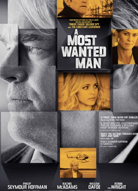Team FYC: A Most Wanted Man for Best Adapted Screenplay
 Saturday, December 13, 2014 at 4:30PM
Saturday, December 13, 2014 at 4:30PM  Editor's Note: We're nearing the end of our individually chosen FYC's for various longshots in the Oscar race. Here's Amir on "A Most Wanted Man".
Editor's Note: We're nearing the end of our individually chosen FYC's for various longshots in the Oscar race. Here's Amir on "A Most Wanted Man".
Anton Corbijn’s latest film, A Most Wanted Man, is one of the year’s best American films. It’s the type of work that is elevated above the trappings of its overly familiar genre with superb performances and intelligent observations on the real world conditions that give birth to its story. It is arguably the smartest film made about America’s increasingly troubled relationship with, and its definition of, terrorism. Yet, it is surprising to compare the film's screenplay, penned by Andrew Bovell, to its original source, the 2008 novel of the same name by John le Carré, and notice the dramatic improvement that the adaptation has made to the text.
With densely plotted novels, particularly in the espionage genre, one of the biggest challenges of adaptation is the careful omission of narrative threads without disrupting the harmony or logic of the story. Le Carré’s book is one of his lesser works, a straightforward piece about Issa (Gregoriy Dobrygin), a Chechen fugitive in Hamburg, whose history of being tortured in his homeland is sufficient cause for authorities (German and American) to assume ties with terrorist organizations. Issa’s story is intertwined to three other protagonists who are afforded equal attention in the novel: a banker named Tommy Brue (Willem Defoe), a lawyer named Annabel Richter (Rachel McAdams) and a spy named Gunther Bachmann (Philip Seymour Hoffman)...

Bovell and Corbijn remove almost the entirety of Annabel and Tommy’s back stories and shift the focus of the narrative entirely, tightening the scope of the film but lending it more political resonance. They introduce Dr. Abdullah (Homayoun Ershadi) in the opening scenes instead of the latter half and make several crucial decisions that don’t just improve upon the book, but create thematic subtexts that were absent originally.
Two examples illustrate this best: first, the film eliminates the two most memorable exchanges of dialogue from the book: Bachmann’s Cantata, a long manifesto about the history of Hamburg and how it is interwoven with terrorism in today’s world. In this belligerent speech’s stead, the film relies on the subtlety of Hoffman’s performance and his dejected, knowing gaze, always aware that the anti-terrorist empire is one moment of misjudgement away from complete collapse. One memorable monologue is taken away; a delicate, slow-burner of a performance takes its place to more lingering effect. (Chris Ryan of Grantland has written about this omission at length here.) The second dialogue is the book's finale, a rather explicit definition of extraordinary rendition delivered in lecture form. The film's silent ending is sublime in comparison.
The second example is the addition of Abdullah’s son, Jamal (Mehdi Dehbi), completely absent from the book in the present form. A secret collaborator with Bachmann’s espionage team, Jamal’s character does as much as Issa’s in painting a nuanced portrait of how Muslims as a whole are misunderstood in the West with regards to their views on terrorism. He is less a symbol of tolerance and more a complex figure of conflicted sentiments: peace activist on the one hand, guilt-ridden son on the other. As a smooth, perfectly paced thriller, the screenplay is structurally robust and extremely entertaining, but the sharp commentary on America’s convoluted, haphazard foreign policies – timely as ever in the wake of the release of the torture reports – create a text that is nothing short of outstanding.



Reader Comments (5)
100% agree. A wonderful screenplay (and film!). It's odd to me that thrillers see so little attention in screenplay categories -- as they require such intricate plotting and structure work. The performances in this film were also excellent, and it's too bad that they're not seeing more attention. Thanks for bringing AMWM back into the conversation!
Sometimes taut grown-up movies (see Margin Call, Arbitrage) are too grown-up for Oscar to recognize. Unless you have George Clooney on board.
Hoffman was so good in this! I wonder if they could have gotten some award attention if they wanted it (i.e., released it in December).
Interesting they cut Hoffman giving a soliloquy on terrorism. That would have been fascinating to watch.
If "basic" could apply to movies, it'd apply to this one. It's such an obvious movie for people to say "wow this is great! and the acting is great!" without actually having any nuanced opinions as to why. I mean sure, every aspect of it is competent, but it's not very compelling, it's rather trite and boring and just another variation of the Syriana-vein of political/espionage thrillers that snooze their way into theaters each year.
Rahul- Look, I'm not saying I'm a great writer or anything, but I tried a teeny bit more than "wow this is great" and specifically explained why I think it's better than run of the mill espionage films like the one you mentioned.
Sorry to hear the film's not your cup of tea.